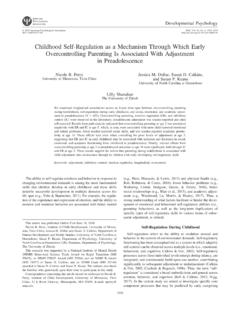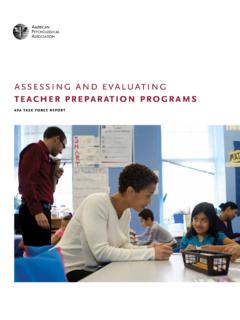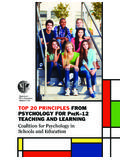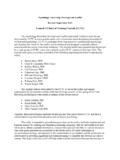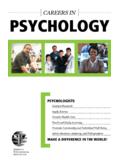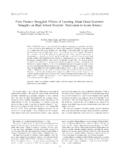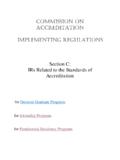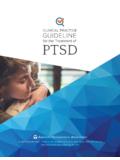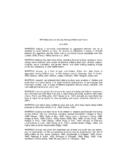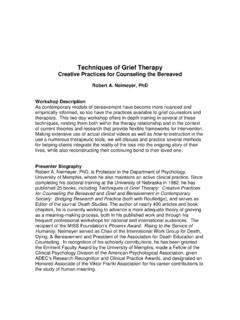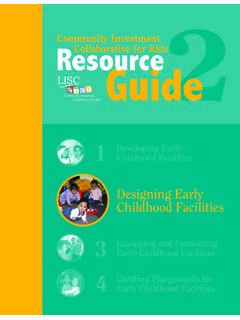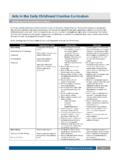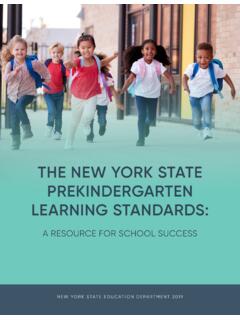Transcription of Top 20 Principles for Early Childhood Teaching and Learning
1 TOP 20 Principles FROM PSYCHOLOGY FOR Early Childhood Teaching AND LEARNINGC oalition for Psychology in Schools and Education COALITION FOR PSYCHOLOGY IN SCHOOLS AND EDUCATIONP rinted copies are available from: Center for Psychology in Schools and Education Education Directorate American Psychological Association 750 First Street, NE Washington, DC 20002-4242 202-336-5923 Email: A copy of this report is available online at: Suggested bibliographic reference: American Psychological Association, Coalition for Psychology in Schools and Education. (2019). Top 20 Principles from psychology for Early Childhood Teaching and Learning .
2 Retrieved from Copyright 2019 by the American Psychological Association. This material may be reproduced and distributed without permission provided that acknowledgment is given to the American Psychological Association. This material may not be reprinted, translated, or distributed electronically without prior permission in writing from the publisher. For permission, contact APA, Center for Psychology in Schools and Education, 750 First Street, NE, Washington, DC reports synthesize current psychological knowledge in a given area and may offer recommendations for future action. They do not constitute APA policy nor commit APA to the activities described therein.
3 This particular report originated with the Coalition for Psychology in Schools and Education, an APA-sponsored group of psychologists representing APA divisions and affiliated 20 Principles FROM PSYCHOLOGY FOR Early Childhood Teaching AND LEARNINGAPA StaffRena Subotnik, PhDMaha Khalid Heather FinsterLauren Cassini DaviContributing authors, members and former members of Coalition for Psychology in Schools and Education that contributed to the original Top 20 Principles from Psychology for PreK-12 Teaching and Learning report: Larry Alferink, PhD Eric Anderman, PhD Joshua Aronson, PhD Cynthia Belar, PhD Mary Brabeck, PhD Hardin Coleman, PhD Jane Conoley, PhD Darlene DeMarie, PhD Carol Dwyer, PhD ContributorsKimber Bogard, PhD Lauren Fasig Caldwell, PhD Amanda Clinton, PhDTimothy W.
4 Curby, PhDDarlene DeMarie, PhDSarah Elbaum, MA Roseanne L. Flores , PhD Jordan Greenburg, BAWendy Grolnick, PhDBenjamin Heddy, PhDMarylou Hyson , PhDJacqueline Jones, PhDCara Laitusis, PhDRochelle Michel, PhDPatricia Smiley, PhDPablo Tinio, PhD Adam Winsler, PhDCo-ChairsRoseanne L. Flores, PhD Darlene DeMarie, PhD Sandra Graham, PhD Robyn Hess, PhD Randy Kamphaus, PhD Geesoo Maie LeeJoan Lucariello, PhD (Chair) James Mahalik, PhD Rob McEntarffer, PhD John Murray, PhD Bonnie Nastasi, PhD Sam Ortiz, PhD Mary Pitoniak, PhD Jonathan Plucker, PhD Isaac Prilleltensky, PhD Steven Pritzker, PhD Peter Sheras, PhD Russ Skiba, PhD Gary Stoner, PhD Rena Subotnik, PhD Adam Winsler, PhD Jason Young, PhD Contents 1 CONTENTSTOP 20 Principles FROM PSYCHOLOGY FOR Early Childhood Teaching AND 20 Do Children Think and Learn?
5 8 What Motivates Children?..20 Why are Social Context, Interpersonal Relationships, and Emotional Well-Being Important to Children s Learning ?..26 How Can the classroom Best Be Managed?..30 How Can Educators Assess Children s Progress?..332 PRINCIPLE 1 Children s beliefs or perceptions about intelligence and ability affect their cognitive functioning and 2 What children already know affects their 3 Children s cognitive development and Learning are not limited by general stages of 4 Learning is based on context, so generalizing Learning to new contexts is not spontaneous but instead needs to be 5 Acquiring long-term knowledge and skill is largely dependent on 6 Clear, explanatory, and timely feedback to children is important for 7 Children s self-regulation assists Learning .
6 And self-regulatory skills can be 8 Children s creativity can be 9 Children tend to enjoy Learning and to do better when they are more intrinsically rather than extrinsically motivated to 10 Children persist in the face of challenging tasks and process information more deeply when they adopt mastery goals rather than performance 11 Teachers expectations about their students affect children s opportunities to learn, their motivation, and their Learning 12 Setting goals that are short term (proximal), specific, and moderately challenging enhances motivation more than establishing goals that are long term (distal)
7 , general, and overly 13 Learning is situated within multiple social 14 Interpersonal relationships andinterpersonal communication are critical to both the Teaching Learning process and the social development of 15 Emotional well-being influences educational performance, Learning , and 16 Expectations for classroom conduct and social interaction are learned and can be taught using proven Principles of behavior and effective classroom 17 Effective classroom management is based on (a) setting and communicating high expectations, (b) consistently nurturing positive relationships, and (c)
8 Providing a high level of support to 18 Formative and summative assessments are both important and useful but require different approaches and 19 Children s skills, knowledge, and abilities are best measured with assessment processes grounded in psychological science with well-defined standards for quality and 20 Making sense of assessment data depends on clear, appropriate, and fair 20 Principles FROM PSYCHOLOGY FOR Early Childhood Teaching AND LEARNINGI ntroduction 5 INTRODUCTIONP sychological science has much to contribute to enhancing Teaching and Learning in the classroom . Teaching and Learning , in turn, are intricately linked to social and behavioral factors of human development, including cognition, motivation, social interaction, and communication.
9 Psychological science also contributes to effective instruction; classroom environments that promote children s Learning ; appropriate use of assessment including data, tests, and measurement; as well as research methods that inform practice. We present here the most important Principles from psychology, the Top Twenty, that would be of greatest use in the context of Early Childhood Teaching and Learning as well as applications for each classroom practice. After the description of each principle, relevant supporting research is provided followed by a discussion of the principle s relevance for the authors of this document, the Coalition for Psychology in Schools and Education, and APA generally, has been putting psychological science to work for pre-collegiate education for over a decade.
10 Many modules and white papers for teachers are freely available on the APA website ( ). The Coalition is an ideal group for translating psychological science for classroom use. Its members collectively represent a wide spectrum of sub-disciplines in psychology including: Evaluation, Measurement, and Statistics; Developmental Psychology; Behavioral Neuroscience and Comparative Psychology; Personality and Social Psychology; the Psychology of Aesthetics, Creativity, and the Arts; Consulting Psychology; Educational Psychology; School Psychology; Counseling Psychology; Community Psychology; Psychology of Women; Media Psychology and Technology; Group Psychology and Group Psychotherapy; Psychological Study of Culture, Ethnicity, and Race.
